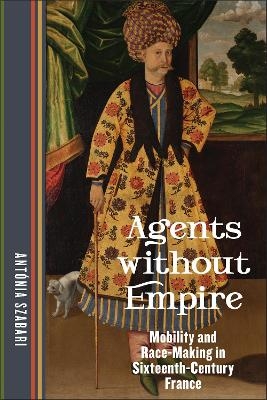
Agents without Empire
Fordham University Press (Verlag)
978-1-5315-0667-4 (ISBN)
Szabari argues that before the rise of the French colonial empire, medieval categories of race based on the redemption story were recast through accounts of the Ottoman Empire that were made accessible, in a sudden and unprecedented manner, to agents of the French crown. Spying performed by Frenchmen in the Ottoman Empire in the sixteenth century permeated French culture in large part because those who spied also worked as knowledge producers, propagandists, and artists. The practice changed what it meant to be cultured and elite by creating new avenues of race- and gender-specific consumption for French and European men that affected all areas of sophisticated culture including literature, politics, prints, dressing, personal hygiene, and leisure.
Agents without Empire explores race making in this period of European history in the context of diplomatic reposts, travel accounts, natural history, propaganda, religious literature, poetry, theater, fiction, and cheap print. It intervenes in conversations in whiteness studies, race theory, theories of agency and matter, and the history of diplomacy and spying to offer a new account of race making in early modern Europe.
Antónia Szabari is professor of French and comparative literature at the University of Southern California. Her interests include early modern literature and political culture, interspecies ethics, plant ontology, and speculative fiction, both old and new. She is the author of Less Rightly Said: Scandals and Readers in Sixteenth-Century France (Stanford University Press, 2009) and co-author, with Natania Meeker, of Radical Botany: Plants and Speculaive Fiction (Fordham University Press, 2019), winner of the 2019 Science Fiction and Technoculture Studies book prize.
Preface | ix
Introduction: French Agents in the Ottoman Empire | 1
1 Big Appetite and Rabelais’s Multiracial Empires | 29
2 Bird-Man 2, Female Androgyne, and Other Speculative Transformations | 60
3 Snake Women of the East: Staging Freedom and Invisible Unfreedoms | 89
4 Nicolas de Nicolay’s Empire of Ink | 121
5 Distancology and Universalizing French Masculinity | 160
Coda: Race and Self-Discovery | 189
Acknowledgments | 197
Notes | 199
Works Cited | 249
Index | 269
| Erscheinungsdatum | 06.02.2024 |
|---|---|
| Zusatzinfo | 23 b/w illustrations |
| Verlagsort | New York |
| Sprache | englisch |
| Maße | 152 x 229 mm |
| Gewicht | 458 g |
| Themenwelt | Geschichte ► Allgemeine Geschichte ► Neuzeit (bis 1918) |
| Geisteswissenschaften ► Sprach- / Literaturwissenschaft ► Anglistik / Amerikanistik | |
| Geisteswissenschaften ► Sprach- / Literaturwissenschaft ► Literaturwissenschaft | |
| ISBN-10 | 1-5315-0667-4 / 1531506674 |
| ISBN-13 | 978-1-5315-0667-4 / 9781531506674 |
| Zustand | Neuware |
| Haben Sie eine Frage zum Produkt? |
aus dem Bereich


